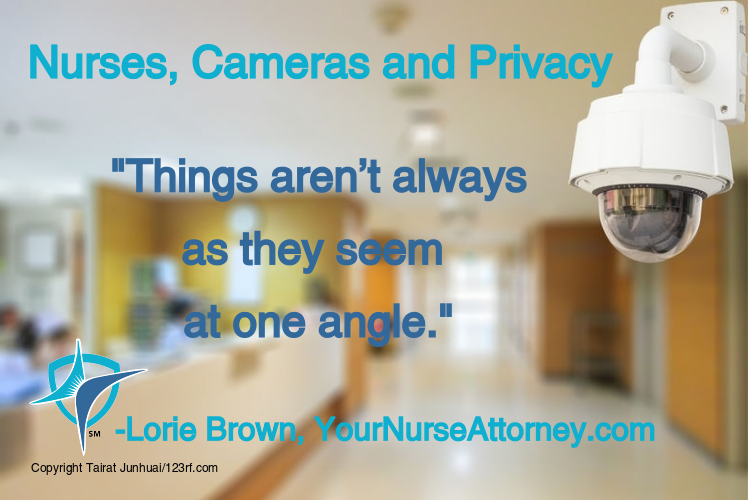
These days cameras are everywhere. In fact, in the United Kingdom, any person can be seen on camera at least 300 times every day as the devices are everywhere. Every time you’re on the street, every time you enter a store, restaurant or bank, drive into a public garage … anywhere and everywhere the chances are likely that a camera is looking at you. And now they are making their way into hospitals around the world.
A recent case in San Diego against Sharp Hospital, Administration put 3 motion detector cameras on their anesthesia medication cart because someone was stealing propofol. However, the cameras did not shut off when there was no motion and it happened to be in an OB surgical suite where women were having babies by C-section and GYN type surgeries where the patients’ genitalia were exposed. These patients, some of whom
There are also ICUs where patients consent to be monitored on video tape called E ICU. Video cameras are sometimes located in public areas of hospitals and health care facilities.
I think cameras can help … and they can hurt.
The idea of having cameras at the Pyxis is to see who takes medication and whether medication is properly wasted. This can be helpful to show your properly wasted medication with a witness or it can hurt if you forgot to sign out that you administered the medication. If your facility does have a camera at the Pyxis, I would recommend that you administer the ordered medication to the patient right away,
Cameras also can be a disservice because they capture images at only one angle and you cannot get the true 3-D picture. If you go to break up an altercation with patients in a hall, what the video shows will depend at which the camera views the scene. Or, if you are providing care to a patient on video, it may be misconstrued that you are being rough with a patient. Things aren’t always as they seem at one angle. Sometimes you need multiple angles.
I do have concerns about patients’ privacy on video. I think sometimes facilities will give you a paper and ask you to sign it and most will do as they are told but not bother to read it.
In some respects, cameras can be a blessing and help a person if the footage is kept and sometimes it can be a curse.
What are your thoughts on being videotaped doing your job?








Eva Shay says
There is great debate on families video recording in the delivery room. Many times they don’t ask the nurses permission to record her nor is she aware. We actually had a patient who is a photographer to have someone video her entire labor and birth experience with all of our nurses in it and posted it to her professional website for advertisement.
LORIE A BROWN, R.N., M.N., J.D. says
Interesting. Thanks for sharing. When my daughter was born, we could video only after delivery.
Ann Spafford says
I’m fine with video taping as long as permission is obtained from all involved. This can be difficult . As a bedside nurse , I’m used to family centered care- where you may not have a camera on you, but you have a hyper vigilant loved one watching and documenting your every move.
Kimberly Mills RN says
I understand the need for permission and safety both.
My concern as an ER Nurse is the use of cellphone cameras and video recording of patients without their permission by other patients and visitors— yes also staff but repeatedly at our facility staff has found visitors videoing other patients under a curtain while undressing and critical patient and psych patients during incidents that get posted to local websites without our knowledge— How do you stop this??
LORIE A BROWN, R.N., M.N., J.D. says
Thanks for sharing. I had not thought of that. Maybe there should be a no cell phone policy in the ER.